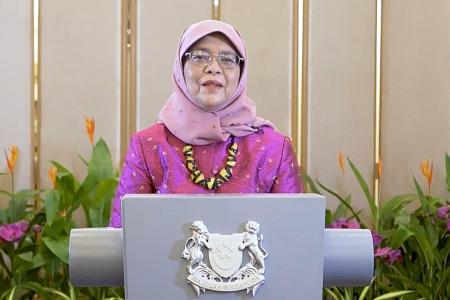IMH, agencies to team up on youth mental health issues
Partnership under President's Challenge will enhance training curriculum to improve care
Social service agencies will soon get better support in managing mental health issues, especially among young people.
The Institute of Mental Health (IMH) will partner the President's Challenge and work with social service agencies to create a training curriculum to help them better care for youth with mental health conditions.
President Halimah Yacob announced this yesterday during her speech at the third Asia Pacific Conference and Meeting on Mental Health, which was hosted by mental health advocacy organisation Silver Ribbon Singapore.
At the conference, which was held virtually, Madam Halimah said she was "particularly concerned" about the challenges the younger generation faces.
She noted that from 2015 to last year, the number of adolescents seen at IMH for depression rose by about 60 per cent.
The President's Challenge designated mental health as its focus in 2018 and has since allocated around $1.8 million to support various programmes in this area.
Associate Professor Daniel Fung, chief executive of IMH, told The Straits Times the institute already has a curriculum for training community partners in basic mental health awareness of common disorders and crisis management.
This will be enhanced to cover a wider range of skills so that the agencies can manage youth with mental health difficulties.
In this way, IMH hopes to equip the various agencies in Singapore with better skills and knowledge, explained Prof Fung.
One goal of the programme is to educate agencies on youth mental health issues and hone their skills in performing mental state and risk assessments.
CO-MANAGE CASES
Another goal is to teach them how to co-manage cases within the ecosystem and perform psycho-education and basic psychosocial and behavioural interventions.
IMH is aiming to start the training programme early next year.
Mr Cho Ming Xiu, founder and executive director of Campus PSY, a social service agency focusing on youth, called the curriculum a "great initiative".
He said: "A standardised curriculum will help set a professional standard among the different social service agencies."
Prof Fung said today's youth face increasingly complex and novel challenges and pressures compared with those in the past.
Mr Cho agreed, noting that those at school have to deal with academic pressure and increasing competition, which are exacerbated by social media.
Home-based learning measures also prevent young people from meeting their friends at school, which may result in social isolation.
Meanwhile, young working adults may struggle with uncertainty over their jobs and finances due to the Covid-19 pandemic, while also juggling increased pressure to settle down and start a family, said Mr Cho.
He added that it is important to focus on upstream solutions such as identifying the early signs of mental health conditions among young people while they are still in school.
This will help prevent them from spiralling to more severe mental health conditions in the future, he said.
Madam Halimah said in her speech that with the right support, social service agencies may be in a good position to provide care in a community setting to people with mental health conditions.
Mr Cho agreed and pointed out that social service agencies currently face issues with funding and manpower, and that more could be done in these areas.
Get The New Paper on your phone with the free TNP app. Download from the Apple App Store or Google Play Store now



